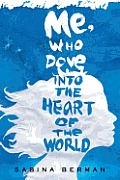
I live outside the bubble of language. Me, that's my name. Like you, I was born outside the bubble of language, but Me, I never forget it. That's probably because I spent so many years outside it, without speaking like a standard human. I was born in a cellar with one open wall facing the Gulf of Mexico. Until I was 12 years old, mostly what I did was dive into the turquoise blue water and swim around the red and black coral and watch sea horses sleep on their tails. My only friends back then were tuna. The aquatic animals, I mean, not cans of. They'd come to my little section of sea to swim, to nibble at the coral, to gobble up a few silvery sardines, and to nudge me with their heads ? and for me to nudge them with my head.
I'm going to have a glass of water; I'll be right back.
I was saying that I didn't learn to use words until I was 12, and that's why now, at 42, I prefer scuba diving to spending time with standard humans. I watch them ? standard humans ? walk and stop and tell stories all day long. Blah blah blah blah, talking is what they do most: at work, at school, at home. Face to face, but also over the telephone or by typing on a computer or a cell phone. Blah blah blah. Words, words, words. That, you see ? exchanging information and keeping their bubble of language closed off ? is what they've been trained to do from the time they were children. To live in the illusion that they live in a bubble of human words and not on a planet full of surprises and fears. This is almost unbelievable, but in their free time, they turn on the television or pay to go to the movies to see other standard humans blah-blah-blah-ing. And at night, to rest, they go to sleep and then in their dreams, they fantasize about still more standard human stories.
Some of them ? I had a roommate like this at college, when I studied animal husbandry ? actually pay to lie down on a psychoanalyst's sofa and tell him stories (even though she was the one paying). She said she was trying to find herself, there in an office where she and the doctor were alone; and she still said she couldn't find herself. Oh Karen, she'd say to Me at night, lying in her bed, which was beside my bed, Oh Karen, the harder I look for myself, the less able I am to find myself. That really was the limit: there she was laid out beside Me and she couldn't find herself. I don't know why I didn't charge her to tell her where she was. I suppose because I'm slow and it didn't occur to me until she was already lost in "a life of routines where I'm a nobody, oh Karen." She wrote that to Me 15 years ago.
This is a really hot summer; I'm going for another glass of water.
 In the ocean, though, all of the animals are silent. That's why I prefer them. Like Me, they know that things are what they are, and that they're not what they're not. They don't know how to lie so they don't have fantasies. They just do what they do and that's that. And they aren't cruel: if a shark opens its jaws and swallows up an entire family of salmon, he just swallows them ? that's it. Before doing so, he doesn't play nice, he doesn't tease them or terrorize them, he just does his shark thing: swallow them up. I stretch out on the white sand of the sea floor and that's when I do what I like best in this life. Being. Being like a quiet rock. Being, and looking up as silver-colored bubbles come out the mouthpiece of my oxygen tank.
In the ocean, though, all of the animals are silent. That's why I prefer them. Like Me, they know that things are what they are, and that they're not what they're not. They don't know how to lie so they don't have fantasies. They just do what they do and that's that. And they aren't cruel: if a shark opens its jaws and swallows up an entire family of salmon, he just swallows them ? that's it. Before doing so, he doesn't play nice, he doesn't tease them or terrorize them, he just does his shark thing: swallow them up. I stretch out on the white sand of the sea floor and that's when I do what I like best in this life. Being. Being like a quiet rock. Being, and looking up as silver-colored bubbles come out the mouthpiece of my oxygen tank.
I own seven tuna fisheries on the Mediterranean coast, where every day we kill an average of 7,000 tuna, which we ship to markets in 18 countries around the world, where they are distributed to thousands of sushi bars, where they are sliced into thin strips that are served on white plates so a few homo sapiens can eat them, and then pay 35 dollars a slice, if they are the fattiest slices ? the ones coming from the belly of the tuna called toro ? or five dollars if they are the driest. For now, I am a millionaire, and although I live on frozen yogurt and honey, I know that my bank accounts have enough money in them to buy me several jet planes.
Now then, is it a contradiction for me to kill tuna, when tuna are my best friends? Of course it is; it's an enormous contradiction. How did I get myself into such an enormous contradiction? That's what the book I wrote three summers ago is about.
I'm slow. I hope to escape this contradiction, but be patient with Me, because I'm very slow. On standard IQ tests, 90% of my results rank Me as an idiot or an imbecile, but 10% put Me in the percentile of geniuses. No doubt that it's from that 10% that the solution should come. I know that if I find a solution to this, I will be finding a solution to something important: The survival of the tuna species. Perhaps even the survival of my happiness. How long will it take Me to find a solution? In the last three pages of the book I explain exactly how and how many years it will take Me to repopulate the sea with tuna.
For now, I'm going for another glass of water.